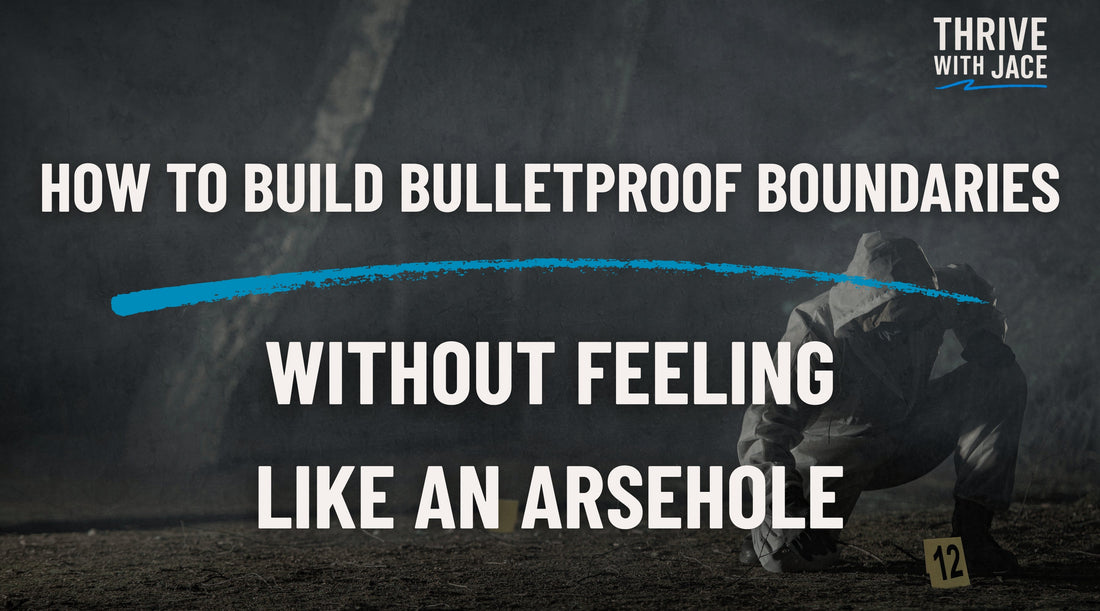
How to Build Bulletproof Boundaries Without Feeling Like an Arsehole
Share
Boundaries get a bad rap
People think they’re harsh. Selfish. Confrontational.
That setting one makes you cold, difficult, or a bit of a pain.
But here’s the truth:
If you don’t build boundaries, you’ll burn out.
If you don’t protect your time, energy and peace, no one else will.
This isn’t about becoming ruthless.
It’s about becoming responsible for your own mental state, emotional health and quality of life.
Because the only thing worse than disappointing others is betraying yourself on repeat.
My Boundary Wake-Up Call
There was a time when I said yes to everything.
Extra shifts. Last-minute favours. Conversations I didn’t have time or capacity for.
And because I “could handle it,” I told myself it was fine.
Until I found myself driving home one night, genuinely hoping someone would cancel the next thing I’d agreed to. Not because I didn’t care, but because I had nothing left to give.
That was the moment I realised:
I wasn’t being generous. I was being dishonest.
Saying yes when I meant no. Smiling when I felt resentful. Showing up physically but checked out emotionally.
That’s not kindness. That’s people-pleasing dressed up as integrity.
Why We Struggle to Set Boundaries
Most people don’t avoid boundaries because they don’t know how.
They avoid them because of the stories they’ve attached to them.
“If I say no, I’ll let them down.”
“If I push back, they’ll think I’m difficult.”
“If I protect my time, I’ll look selfish.”
“If I stop overgiving, I’ll lose their respect.”
Those stories are lies.
Fed by fear. Reinforced by habit. And fuelled by the idea that your worth is tied to your usefulness.
It’s not.
What Boundaries Actually Do
1. They Protect Your Energy
Not every conversation, request, or invitation deserves your attention. Boundaries help you keep the main thing the main thing, especially when everything’s loud.
2. They Teach People How to Treat You
Every time you say yes when you mean no, you train people to ignore your limits. That’s not their fault. That’s on you.
3. They Build Self-Trust
When you honour your own lines, you stop second-guessing yourself. You start backing your own decisions. And that changes everything.
Boundaries Without the Guilt Trip
The biggest fear most people have is, “If I set this boundary, I’ll feel like a prick.”
Fair. I’ve been there.
But here’s how you do it without guilt and without sounding like a robot reading from a self-help script.
1. Get Clear on Your Values
Boundaries don’t exist in a vacuum. They’re based on what matters to you.
If health is a value, late-night favours that steal your sleep get a no.
If honesty is a value, pretending to be okay when you’re not gets cut.
If respect is a value, letting people speak to you like you’re less than stops now.
Your boundaries don’t need to make sense to other people.
They just need to reflect the life you’re trying to build.
2. Use Simple, Clean Language
No over-explaining. No apologising. No emotional backflips.
Try:
“I’m not available for that.”
“I can’t commit to that right now.”
“I need some space. I’ll get back to you tomorrow.”
“That doesn’t work for me.”
That’s it. No justifying. No guilt.
3. Stick to It When It’s Inconvenient
Anyone can set a boundary when it’s easy.
But the moment someone pushes back, that’s the real test.
If they respect you, they’ll respect it.
If they don’t, good. You’ve just revealed something important.
Boundaries Aren’t Walls
Let’s be clear. Boundaries aren’t about shutting everyone out.
They’re not barriers. They’re filters.
They protect what matters. They create safety. They help you show up more fully for the people and things that actually deserve your time.
And here’s the truth. When your boundaries are solid, your presence becomes sharper, cleaner, more powerful.
Because you’re not showing up from obligation.
You’re showing up from alignment.
What Happens When You Don’t Set Them
You lose yourself. Slowly.
You say yes to everything and start resenting everyone.
You burn through your social battery and blame it on “being introverted.”
You become a sponge for other people’s emotions and wonder why you’re exhausted.
You forget what you actually want, because your life is just reactions.
That’s not resilience.
That’s self-abandonment.
This is Positive Selfishness
It’s not selfish to set a boundary.
It’s selfish not to.
Because when you’re drained, disconnected and resentful, you become worse for everyone around you, not better.
This is positive selfishness.
It’s you saying: I’ll look after me, so I can show up well for everything and everyone I care about.
Need a Starting Point?
If this has stirred something, here’s how to take action today:
✅ The 3-Day Resilience Reset
Day 2 walks you through a full boundary audit. It helps you spot where you’re leaking energy and how to fix it fast.
📖 Grab the free 30-page preview of Thrive in Chaos
I break down emotional boundaries, decision fatigue and how to reset your system in the middle of pressure. It’s gritty, practical, and you’ll see yourself in it.
🧠 Download the Resilience Rapid Response Kit
There’s a printable tool in there for boundary scripts and reset routines. Use it when your head’s too full to think straight. It’ll walk you through it.
Final Thought
You don’t need to be rude.
You don’t need to be cold.
You just need to be clear.
Protect your time. Protect your peace.
You’ll piss a few people off, but you’ll finally stop pissing yourself off.
And that’s worth it.
